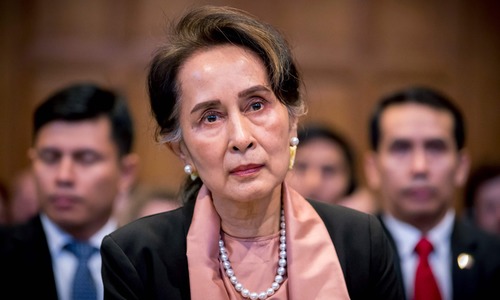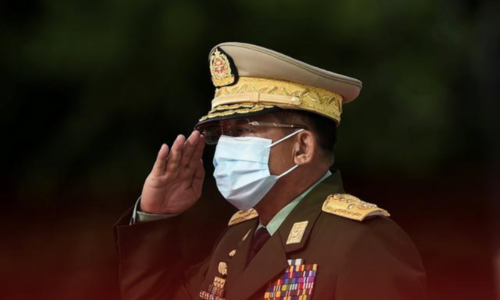Aung San Suu Kyi, who spent 15 years under house arrest in the struggle to bring democracy to Myanmar, has been detained along with other leaders of her political party in a military coup.
Beloved in Myanmar as “the Lady”, Suu Kyi fulfilled the dreams of millions when her party won a landslide election in 2015 that established the Southeast Asian nation's first civilian government in half a century.
But the Nobel laureate appalled the world two years later by denying the extent of a sweeping military-led crackdown against the Rohingya Muslim minority which forced hundreds of thousands to flee the country.
In Myanmar, Suu Kyi remains adored but she has failed to unite its myriad ethnic groups or end its decade-long civil wars. She also oversaw tightening restrictions on the press and civil society and has fallen out with many former allies.
This timeline charts Aung San Suu Kyi’s journey from political prisoner to leader of her troubled nation.
June 19, 1945: Suu Kyi, daughter of Myanmar’s independence hero General Aung San, is born. Her father is assassinated when she is two years old.
1988: She returns to Myanmar to care for her dying mother and is swept up in nationwide protests against decades of military rule.
1989: Having crushed the protests and killed thousands, the military puts Suu Kyi under house arrest.
1991: While detained in her lakeside home in Yangon, she wins the Nobel Peace Prize.
1995: She is released and regularly speaks to large crowds outside her gates.
1999: Her husband, British scholar Michael Aris, dies of cancer. Suu Kyi chose not to leave Myanmar to see him in case the junta blocked her return.
2000: She is detained again for 19 months.
2003: Pro-junta thugs attack her and kill several of her supporters.
2007: A dramatic rise in fuel prices triggers anti-government protests led by Buddhist monks called the “Saffron Revolution”. Flanked by riot police, Suu Kyi briefly greets monks at the gates of her home, energising the demonstrations, which are soon quashed by the military.
2010: A party created by the military wins a general election by a landslide. Suu Kyi’s party, the National League for Democracy (NLD), boycotts the poll, saying the laws governing it are “unjust”.
The military then installs a quasi-civilian government led by former general Thein Sein. A few days later, Suu Kyi is released to global jubilation.
2012: Most Western sanctions on Myanmar are scrapped, as Thein Sein lifts censorship, frees hundreds of political prisoners and launches a series of reforms.
April 2012: Suu Kyi decides to contest by-elections. Her NLD party wins 43 of the 44 parliamentary seats it contests.
May 2012: Suu Kyi takes her place in Myanmar’s parliament in the capital, Naypyitaw.
Early June 2012: Clashes between Rakhine Buddhists and Rohingya Muslims in Rakhine state kill at least 80 people. Thousands of homes are burned down. With parts of the state capital Sittwe still smouldering, Suu Kyi departs on a five-nation tour of Europe.
Nov 2015: The NLD wins a general election by a landslide and Suu Kyi assumes power in a specially created role of state counsellor.

Oct 2016: Rohingya militants attack three police border posts in northern Rakhine, killing nine police officers. Myanmar’s military then carries out a security operation, resulting in some 70,000 people leaving Rakhine for neighbouring Bangladesh.
Aug 25, 2017: Rohingya militants launch attacks across northern Rakhine State, triggering a military-led campaign that drives more than 730,000 Rohingya into Bangladesh.
Sept 19, 2017: Suu Kyi addresses the Rakhine crisis in a speech in Naypyitaw, saying military operations are over, as Rohingya flee and villages burn. She faces mounting international criticism for her response to the crisis.
Nov 13, 2018: Amnesty International withdraws its most prestigious human rights prize from Suu Kyi, accusing her of perpetuating human rights abuses by not speaking out about violence against the Rohingya.
Jan 29, 2019: NLD clashes with military lawmakers as it proposes steps towards changing the constitution, its biggest challenge in nearly three years to the army’s power over politics as enshrined in the charter.
Dec 2019: After a three-day hearing, Suu Kyi calls on World Court judges in The Hague to dismiss an accusation of genocide against the Rohingya brought by Gambia.
Jan 23, 2020: The International Court of Justice orders Myanmar to take urgent measures to protect its Rohingya population from genocide, in a preliminary decision on the charges brought by Gambia.
Nov 13: The NLD said it would seek to form a government of national unity after official election results showed it had comfortably won enough parliamentary seats to form the next administration. The main opposition, the military-backed Union Solidarity and Development Party (USDP), alleges irregularities and demands a re-run.
Jan 26, 2021: Army military spokesman Brigadier General Zaw Min Tun warns it will “take action” if the election dispute is not settled, asking the election commission to investigate voter lists it said contained discrepancies.
Jan 28: The election commission rejects allegations of vote fraud, saying there were no errors big enough to impact the credibility of the vote.
Feb 1: Suu Kyi, President Win Myint and other senior figures from the ruling party are detained in an early morning raid that the military said was a response to “election fraud”.














































